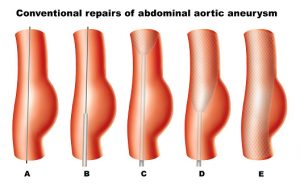 Abdominal aortic aneurysm risk may decrease if you eat more than two servings of fruit daily. The Swedish study found that people who reported consuming more than two servings of fruit a day had a lower risk of abdominal aortic aneurysm – a life-threatening condition – compared to those who consumed less fruit.
Abdominal aortic aneurysm risk may decrease if you eat more than two servings of fruit daily. The Swedish study found that people who reported consuming more than two servings of fruit a day had a lower risk of abdominal aortic aneurysm – a life-threatening condition – compared to those who consumed less fruit.
Abdominal aortic aneurysm is the ballooning of the lower part of the aorta, which is the main vessel that supplies the body with blood. Older men who smoke are at highest risk to develop abdominal aortic aneurysm. Abdominal aortic aneurysm can be detected through ultrasound.
Advertisement
For the study, 80,000 people were divided into four equal groups based on their consumption of fruits and vegetables. Over the course of 13 years, deaths and hospital visits were recorded for 1,086 people with abdominal aortic aneurysm, with 222 ruptured. Majority of the ruptures occurred in men.
The researchers found that those with the highest fruit consumption had a 25 percent lower risk of the aortic condition and 43 percent reduction in a ruptured aneurysms, compared to the group with the lowest fruit consumption.
Those who had two are more servings had a 31 percent lower risk of non-ruptured aneurysms and a 39 percent reduction in ruptured aneurysms, compared to those who did not consume any fruit.
Lead author Otto Stackelberg said, “A high consumption of fruits may help to prevent many vascular diseases, and our study suggests that a lower risk of abdominal aortic aneurysm will be among the benefits. Vegetables remain important for health. Other studies have found that eating more fruits and vegetables may decrease the risk of cardiovascular diseases, type 2 diabetes, high blood pressure, and several cancers.”
Most common fruits consumed were apples and pears, followed by bananas, oranges, and other citrus fruits.
The American Heart Association recommends that adults consume four to five servings of fruits and vegetables daily based on a 2,000 calorie diet. Fruits and vegetables provide essential nutrients and are naturally low in saturated fat and cholesterol.
Aside from consuming plenty of fruit as a means to lower the risk of abdominal aortic aneurysm, the researchers note the importance of not smoking and advise smokers – especially mean – to quit.
Abdominal aortic aneurysm (AAA) prevention
As mentioned, the best means to prevent abdominal aortic aneurysm from occurring is to consume plenty of fruit and vegetables along with quitting smoking. Exercising regularly and maintaining a healthy weight are also effective means to reduce the risk.
Your diet should be low in fat, especially saturated fat, as it contributes to atherosclerosis, which is hardening of the arteries. Smoking, too, contributes to atherosclerosis and raises blood pressure. Furthermore, nicotine contains substances that damage the walls of the arteries. It’s been reported that smokers are seven times more likely to develop abdominal aortic aneurysm compared to nonsmokers. If you are planning to quit smoking, speak to your doctor, as they can provide you with different options to increase your success in smoking cessation.
Related Reading:
Abdominal aortic aneurysm treatment improved using virtual reality images
Virtual reality images can now be used to help improve treatment of abdominal aortic aneurysms thanks to a technology developed by a group of experts at the University of Montreal Hospital Research Centre. Abdominal aortic aneurysms are serious. If you have an abdominal aortic aneurysm, it means the lower part of your aorta is enlarged. The aorta is the major blood vessel supplying blood to the body. Continue reading…
Advertisement
Early menopause can increase brain (cerebral) aneurysm risk
Early menopause can increase brain (cerebral) aneurysm risk. A cerebral aneurysm is an abnormal bulging of one of the arteries in the brain. It is mainly discovered by the time it ruptures, which can lead to a possible fatal bleed. Continue reading…
Sources:
http://www.nhs.uk/Conditions/repairofabdominalaneurysm/Pages/Prevention.aspx
http://circ.ahajournals.org/content/128/8/795.full
